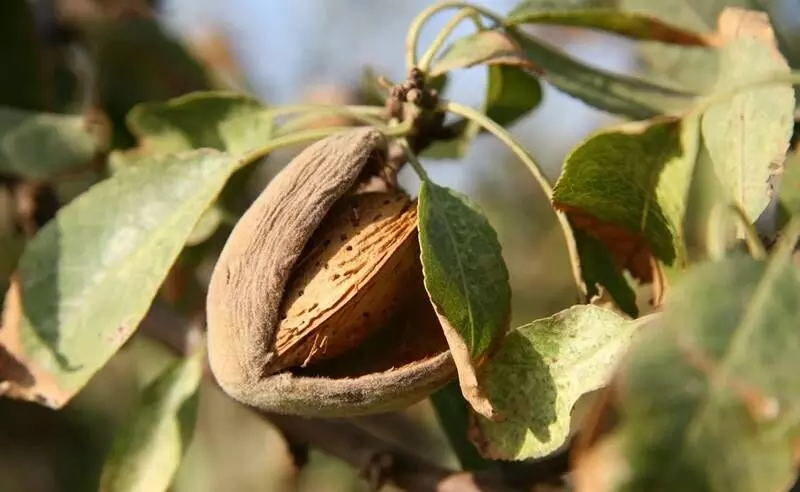Almond cultivation in Kashmir proving to be a hard nut to crack
More than 91% of India's almond production comes from J&K. But, farmers who once exclusively grew almonds in several districts of J&K are shifting to other produce. They say climate change, lack of awareness about modern agri-techniques, and import of cheaper almonds were responsible for the decline in Kashmiri badam production.
 Mubashir Naik 3 Nov 2022 6:40 AM GMT
Mubashir Naik 3 Nov 2022 6:40 AM GMT

Farmers in Kashmir said they are switching over to other crops for reasons ranging from the changing climate to competition from the cheaper varieties of imported almonds.
Mubashir Naik & Irshad Hussain
It isn't without a reason that the sweet almonds of Kashmir, with a higher oil content, are known as the 'King of Dry Fruits'. More than 91 per cent of the total almonds produced in India are cultivated in Jammu & Kashmir, followed by nine per cent in Himachal Pradesh, as documented by the National Horticulture Board.
But, almond orchards of Kashmir are slowly being replaced by other horticulture crops, including apples.
In the mid 90s more than 20,000 hectares of land came under the cultivation of almonds in Jammu and Kashmir. But, as per news reports, by 2020-21, almond cultivation has shrunk to a little more than 5,000 hectares.
Farmers in Pulwama and Budgam were involved in large scale cultivation of almonds. But they are switching over to other crops for reasons ranging from the changing climate to competition from the cheaper varieties of imported almonds.
Also Read: Kashmiri farmers move from paddy fields to apple orchards for higher returns
"Until 2014, I grew almonds on my entire land of 17 kanals (2.125 acres). But I have reduced almond cultivation to only five kanals now," 45-year-old Ghulam Nabi, a farmer from Pulwama, told Gaon Connection. He said that the high price of fertilisers was one of the reasons he was forced to reduce the land under its cultivation.
"Almond growers are unable to sell their produce and government indifference to our plight is another factor for the decline in the industry. The government should have mandis for almonds," Nabi added.
Changing rainfall pattern and lack of irrigation facilities
"Unpredictable and unfavourable weather patterns over the last few years have impacted the almond industry," Amin Ahmed, technical officer of horticulture Kashmir, told Gaon Connection.
A farmer overseeing his almond orchard in Kashmir. Photo courtesy: Umar Farooq
"Almonds need to be irrigated during the growing season (March/April) and the trees use up a lot of water, much more than any other fruit or nut trees. Rainfall is the only source of moisture, and because that has been erratic, it has affected the yield adversely," Amin said.
Also Read: Vineyards take root in Central Kashmir as apple farmers switch to grape cultivation
Another official from the department of horticulture, based in Srinagar, who wished to remain anonymous, told Gaon Connection that climate change along with farm lands being converted for non-agriculture was having an impact on almond cultivation.
There were distinct seasons in Kashmir up until the 1990s, but after that there have been a lot of climatic changes and things were really bad from 1998 to 2003, which were drought years, the official pointed out.
"We fertilise and water the almond fields in early March and if we have a warm summer, then by the end of the month the almond blossoms should be in bloom," almond farmer Nabi explained. But changing weather patterns are affecting the almond harvest, he complained.
Lack of modern techniques; import of cheaper almonds
"Nothing has changed in our cultivation techniques despite so many advancements in agricultural science and advancements," Amjad Ahmad, a farmer from Budgam, told Gaon Connection. "The government seems indifferent to us and we receive no technical help or inputs to improve our lot," he complained. "We have also been growing the same variety of almonds for decades," he added.
Also, the price of almonds has remained constant since 2016, claimed Nabi. "The cost of one mann (40 kg) of almonds has remained at around Rs 6,000-Rs 6,500. But the input costs are almost Rs 50,000 to 80,000, depending on the size of the orchard," he pointed out.
Also Read: Kashmiri carpet weavers burn the midnight oil to weave silk kaleens for the new Parliament building
"India is also importing almonds from Afghanistan and Iran that are slightly cheaper, and larger than Kashmiri almonds, though ours are tastier. But buyers find the appearance of the imported almonds more attractive," Nabi said.
As per official data, almond imports are on the rise in India. From 34,360 metric tonnes in 2008, the almond import jumped to 167,830 metric tonnes in 2020 (see bar graph).
Efforts to promote almond farming
"The government of Jammu and Kashmir has recently launched a Modified High-Density Plantation Scheme for almonds besides other fruit crops," said the technical officer of horticulture, Amin Ahmed.
According to him, high yielding and exotic varieties of almonds are being developed that will be more suitable for prevailing climatic conditions.
"Also, the government of J&K has signed a Memorandum of Understanding with the National Seed Corporation of India to import exotic varieties of almonds which will be made available to the farmers," Amin added.
Also Read: Kashmir's apple crop hit due to low rainfall and drought-like conditions
The department of horticulture is setting up almond-exclusive nurseries so that the latest varieties of almonds are produced locally, Amin Ahmed informed Gaon Connection.
"The department is also developing irrigation infrastructure in almond growing belts under various schemes of the central government such as the Mission for Integrated Development of Horticulture, Prime Minister's Development Package and Pradhan Mantri Krishi Sinchayee Yojana," he said.
Irshad Hussain and Mubashir Naik are independent journalists based in Jammu and Kashmir.
#Almonds #Kashmir #AlmondCultivation #AlmondBenefits
More Stories




